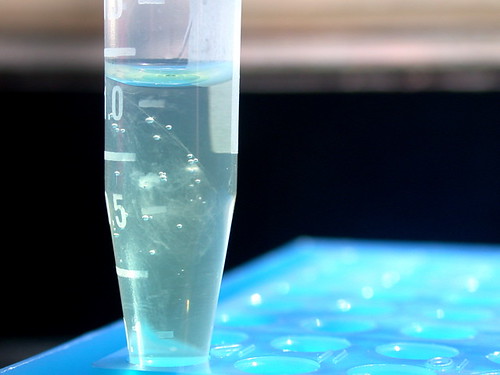The BBC were running a story all yesterday about how cheese and yoghurt taste different when eaten in different ways, like from a metal versus plastic spoon? Did you hear it? http://bit.ly/CheeseSense Their science editors made a mistake, because they thought it was a science is silly story. That's is pretty much mostly what the BBC science editors like.
So why is it not silly? Because it is a simple example of a phenomenon so hugely important that it hampers diagnoses, makes creation of new medicines difficult and fuels "woo" science and medicine. People believe they can trust their own senses, but they simply cannot.
So lets have a visual example; this page shows a number of small videos where it is very difficult to spot obvious differences between the two images: http://bit.ly/VisualIllusions.
So as our resident experimental psychologists and neuroscientists will tell you: "you cannot trust your eyes".
Does this relate to cheese taste? YES. You can't trust your eyes, and you can't trust your tongue either. The cheese obviously tastes the same (in that it is chemically identical), but you think it tastes different because of the context. We humans are easily confused. An aside: I guess this proves the Cher song "it's in his kiss" to be totally wrong.
Yuk, may be I shouldn't have gone there.
OK now medicine, "woo medicine" in particular. Pain is just the same. The owner of any particular pain is really bad at knowing the intensity of their own pain. It is a fundamental problem. Now there are several things going on here:
(1) It is difficult to describe or quantify pain. Scoring, as you do to your clinician on their 1-10 scale is difficult. We all know this, but it is different to the topic of this blog.
(2) There are definite built in body processes which dampen down pain in the same way as strong pain killers such as morphine. These tend to be based around chemicals called "endorphins". ...they can be activated, by stress and all sorts of things that are not fully understood. Furthermore, the awful truth about "chronic pain" (sometimes people have long term pain without clear physical cause) is that there seem to be "un-endorphin" mechanisms we know little about (we are tying believe me!!). This is still different though.
(3) Even excluding (1) and (2) we can't judge our own pain! so have you had an aspirin for headache and someone ask you if it's better? you reply something stupid like "I think so"? Well I do!!! ...but is not just me. I was in great pain myself once and given morphine on a drip. I remember saying to my nurse... "I think that seems to be working". Obviously 3o mins later it was blindingly obvious the pain was relieved, but EXACTLY when it went off was always a bit vague to me. So here we now have the nub of the problem... if you give someone a painkiller that is mildly effective it is very difficult for people to really know whether it has "worked" or not. Put pressure on them, by clearly investing a lot of time and effort in trying to help them and they will say "yes its a little better" even if they really don't know. Its human nature. So there are ways we get around this. We use placebos. Just give them nothing disguised as something and see if they can tell the difference? Frequently people "say" they feel better after they actually had nothing. This is sometimes called the "placebo" effect and it is a scientificy way to say they said they thought they were better, but they were mistaken. It's a sensory illusion! People including scientists and clinicians frequently try to investigate a so called placebo effect, but this is nonsense. The phenomenon is simply that there is a tendency for people to believe a pain has improved when really it hasn't. Now this is the same as the cheese*!!
You simply cannot trust your own senses. So if you have a new pill you wish to test, you compare it to a placebo. If it doesn't beat the placebo you through it away. "Simples!"
...but how can you set up a placebo for acupuncture? or gels you smear on your need to help osteoarthritis ....or faith healers etc? You just can't. ...and therefore if you are trying to look for smallish improvements in peoples health and sense of well-being there is no point asking the person concerned. Just like the cheese and the visual illusions, people are too easily confused by the context.
You cannot trust your own senses (or anyone else's).
*There is also the "pressure" aspect, ever asked directions and someone replies in a funny accent?... you will ask them to repeat it once, maybe twice, but embarrassment would prevent you from asking for 100 repeats even if you still didn't get it. Students do it all the time. Their mouths say "yes I understand" their eyes say "I have no idea what you are talking about". The difference here is obviously people know they don't know, but are embarrassed to say...



